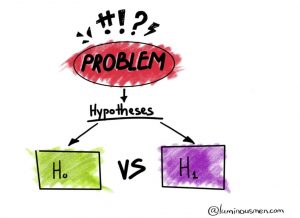
Hypothesis testing is a technique used to determine whether an assumption about the population is true. Null hypothesis and alternate hypothesis are two types of hypotheses that you may hear when conducting this type of test. Having a good understanding about null and alternate hypothesis will help you better design good hypothesis tests and understand their results in a nice manner. It is very important for data scientists to be able to distinguish between null and alternate hypothesis and design hypothesis tests. In this blog post, we will understand the definition and examples of the null and alternate hypothesis.
What are different scenarios for hypothesis testing?
The following are two different scenarios for hypothesis testing:
- Test the claim against well-established beliefs: We perform hypothesis testing to test the claim against something which is considered as justified true beliefs. As per Plato philosophy, justified true beliefs are termed as knowledge. Thus, it can be said that hypothesis testing is done to validate the existing knowledge about a thing. For example, an example of justified true belief is that a 1-litre bottle of water consists of 1 litre bottle of water. If there is a claim that a 1-litre water bottle consists of 900 ml of water, then this claim requires hypothesis testing.
- Test a new claim: Hypothesis testing can also be performed against a new claim about something which does not exist at all in the real world. For example, let’s say that there is a claim that doing 30 minutes of pranayama for 1 year can reduce the LDL (bad cholesterol) level by 20 points.
What is the null and alternate hypothesis?
Hypothesis can be categorized in two different types:
- Null hypothesis represent the claim which is well-established or true justified belief. In addition to well-established beliefs, it represents the default state of the claim in the real world. For example, null hypothesis can be that a 1-KG packet of salt consists of 1 KG of salt. Another example is there is no relationship between pranayama and LDL cholesterol as stated in the previous section. Null hypothesis is typically denoted by H0.
- Alternate hypothesis represents the new claim that needs to be established. For example, a 1-KG packet of salt consists of 900 gm of salt. Or, there is an impact of pranayama on reducing LDL cholesterol. Alternate hypothesis is denoted by H1.
How to formulate null and alternate hypothesis?
Here is the technique which can be used for formulating null and alternate hypothesis:
- The claim that needs to be considered as truth becomes the alternate hypothesis. These claims can be altogether a new claim or a claim against the existing truth. For example, the 1-KG packet of salt consists of 900 gm of salt. This is a claim against an existing truth. Altogether a new claim will be doing paranayam yoga for 30 minutes a day reduces LDL cholesterol by 20 points. These kind of claims will become the alternate hypothesis and denoted by H1.
- The opposite of alternate hypothesis becomes null hypothesis. For example, the 1-KG packet of salt consists of 1-KG salt. This is null hypothesis. Note that this depicts the default state of 1-KG salt in the real world.
What are some examples of null and alternate hypothesis?
The following are some examples of null and alternate hypothesis:
- Investing in stock market: Buying stocks during down market will earn higher returns
- Null hypothesis: It is not true that buying stocks during down market will return higher return
- Alternate hypothesis: Buying stocks during down market earns higher returns.
- New heart medicine: New medicine reduces the risk of heart attack by 60%
- Null hypothesis: It is not true that new medicine reduces the risk of heart attack by 60%
- Alternate Hypothesis: New medicine reduces the risk of heart attack by at least 60%.
In this blog post, we learned about the definition and examples of Null and Alternate Hypothesis. Null hypothesis represents the default state or well-established belief in a particular claim while alternate hypothesis is typically against what is believed as true. For example, buy stocks during down market would have no impact on returns would be null hypothesis. The technique used to formulate Null and Alternate Hypotheses involves identifying whether there is a new claim being made about something which has been established as truth or if someone wants to question existing beliefs and make new claim altogether. If you wanted to learn more, feel free to drop a comment and I will try and address your queries. You may also want to check a related post – Hypothesis testing explained with examples.
- The Watermelon Effect: When Green Metrics Lie - January 25, 2026
- Coefficient of Variation in Regression Modelling: Example - November 9, 2025
- Chunking Strategies for RAG with Examples - November 2, 2025

I found it very helpful. However the differences are not too understandable for me